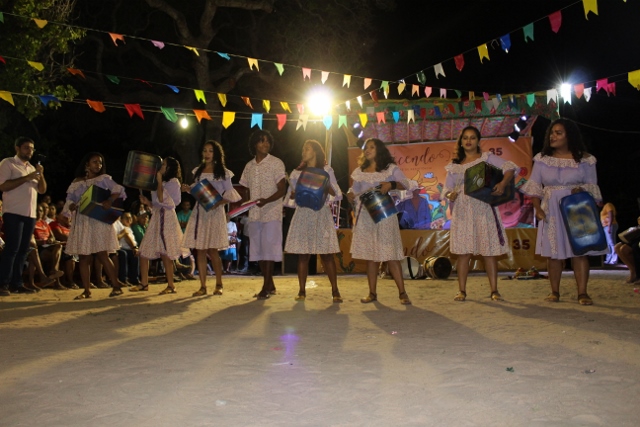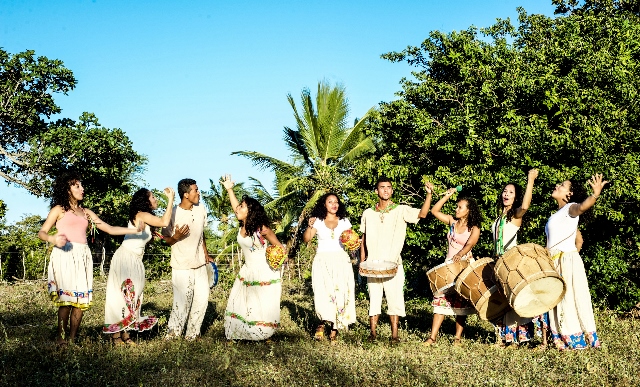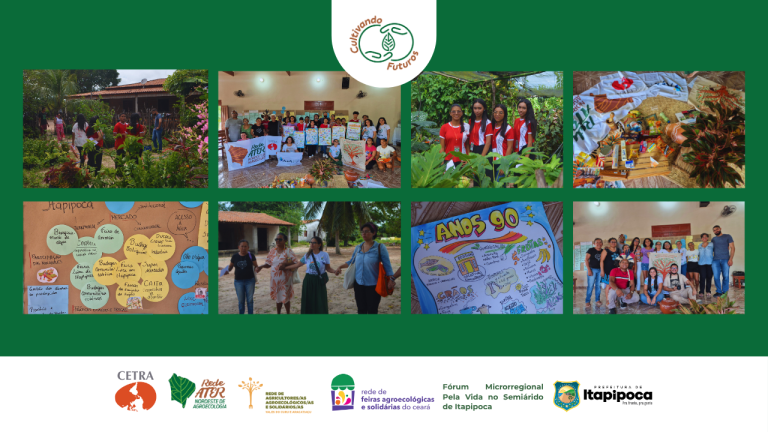Balanço do Coqueiro – young cultural protagonists and affirmative leaders of rural identity
Balanço do Coqueiro – young cultural protagonists and affirmative leaders of rural identity
The ‘Balanco do Coqueiro Group’, from the Maceió settlement in Itapipoca, Ceará, is formed by young cultural protagonists and affirmative leaders of rural identity. Together for almost 10 years, the group builds itself around the rescue of their lands cultural expression, in the valorization of local art, with its drums, rhythms and poetics. They fight for the strengthening of agrarian reform, women’s and youth’s rights on the countryside.
They perform though the artistic and communicative languages (music, dance, theater, photography), besides the management of a ‘rural digital technology house’, where they express themselves through the new information and communication technologies. One of their main activities is to nurture a reforestation area in the community, while at the same time they have a small startup project to extract diverse products from processed coconut oil.
The perspective of these brave rural youngsters was greatly strengthened by the project ‘Um Novo Olhar da Juventude sob o Meio Rural’, (A New Look on the Youth in Rural Areas), launched in 2011 and carried out by CETRA. It aimed to stimulate youth protagonism, providing new perspective on the rural environment, generally abandoned by the youth for the cities, but now proposed as a space for growth and happiness.
“We had a new look at the settlement’s struggles. As there are many settlers in the Sítio Coqueiro community we have always been a group of young people very close to its issues. The community’s relationship with the fact that we are a settlement, all this shame because it was ‘rural’, and a ‘settlement area’…for many that was kind of a guilt. And the project showed us the opposite. On the contrary, this should strengthen us even more because we are rural young people and residents of settlement areas”, says Arildo Soares, one of the group’s members.

The Balanço do Coqueiro, which literally means ‘The Swing of the Coconut Tree’, has already performed three staged shows, the “Flor do meu quintal”, 2014, directed by musician, dancer, actor and teacher Viana Junior; “Um toque de renda”, produced in 2017 and directed by Orlangêlo Leal, from Dona Zefinha band in Itapipoca; and the most recent, ” O meu coco é a cor da minha gente”, which was on the program of the West Coast Dance Festival (2019), and was produced by the group itself.
The three shows address different themes, but all feature the revolutionary poetry of Nazaré Flor, feminist, farmer, militant and composer of the Maceió settlement. The first show is about the history of struggle and resistance over the land, the need to have a place on earth in order to plant and live with dignity. The second spectacle sheds light on the struggle of the women in the settlement: artisans, housewives, educators and activists. The show echoed their triple workday through poetry; the costumes were made on the local handicraft “renda” and the household utensils were used as musical instruments. The last show was produced in a nostalgic perspective the group has with its home place, about its community and the experiences of its members. Bringing to stage the daily strength of their women, their childhood memories, the reverence to the land they inhabit, the show values all the work done by the people in the community, with costumes produced by the local dressmakers and artisans.

The group has already performed at the Ceará International Dance Biennial (2014), the 2nd National Conference on Technical Assistance and Rural Extension (CNATER / 2016), and in various spaces of agroecology and popular culture. The Balanço do Coqueiro is formed mainly by young women, strengthening the leadership and female autonomy in the settlement. says Regilane Alves, a member of the group, says: “Women have always been more in charge of religion in the community, while the practical organization has always been more for men. But today we are awakening people in the community, as we work a lot in groups…In the coconut oil production, the leader today is a young woman. Our generation has been fighting a lot to open these doors. We are not only leaders in religious matters, but also in the other social processes of the community, in the meetings, in the trainings, all that has awakened in the girls a desire to talk and participate”.


